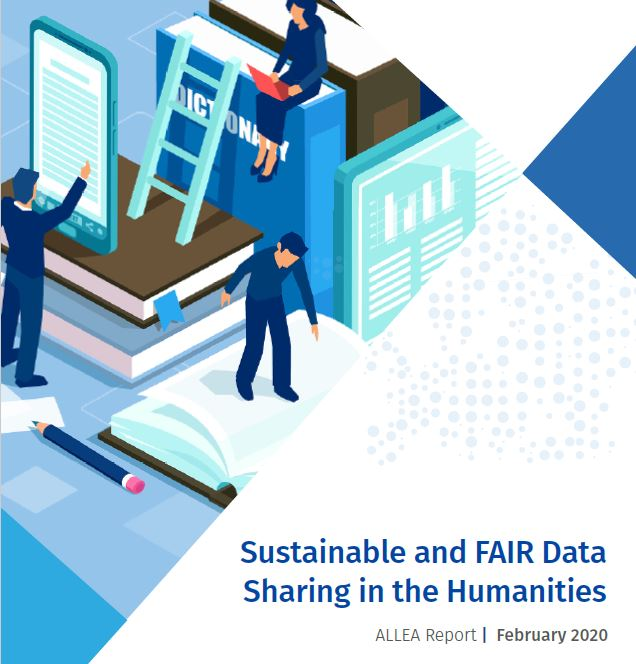Entschuldigung aber dieser Post ist nur für angemeldete Benutzer sichtbar. Wenn Sie Mitglied der Digitalen Akademie werden und Zugang zu diesem Inhalt erhalten wollen, dann melden Sie sich bitte unter https://digitale-akademie.adw-goe.de/anmeldung/ bzw. im Menue Digitale Akademie > Anmeldung an. Sie werden dann nach Überprüfung umgehend einen Account erhalten und können die angefragten Seiten einsehen.
Forschungsdatenleitlinie für die Akademie verabschiedet
Am 22.3.2022 hat das Präsidium der Akademie einstimmig eine Forschungsdatenleitlinie für die Akademie der Wissenschaften zu Göttingen verabschiedet. Es handelt sich um eine Leitlinie zur Bereitstellung von Forschungsdaten der Akademie der Wissenschaften zu Göttingen nach offenen Lizenzen (CC-BY-SA-4.0).
Es ist seit langem das Bestreben der Akademie der Wissenschaften zu Göttingen, die Digitalisierung in den Geisteswissenschaften voranzutreiben und ihre eigenen Forschungsergebnisse und Daten der Öffentlichkeit möglichst unentgeltlich zur Verfügung zu stellen (Open Access). Die Akademie entwickelt zusammen mit der AG eHumanities der Akademienunion und im Rahmen der Nationalen Forschungsdateninitiative (NFDI) zudem Lösungen, um ihre Forschungsdaten dauerhaft nach den FAIR Prinzipien bereitzustellen. Die Akademie betreibt außerdem seit 2012 ein zertifiziertes D-Space Repository unter dem Namen res doctae und hat sich damit schon früh der Bereitstellung von Forschungsergebnissen und Daten nach den Grundsätzen eines offenen und unentgeltlichen Zugangs verpflichtet.
Die von Vorhaben der Akademie der Wissenschaften zu Göttingen im Rahmen des Akademienprogramms erstellten und produzierten Forschungsdaten stehen der Öffentlichkeit nun grundsätzlich für eine Nachnutzung unter der Creative Commons Attribution-ShareAlike 4.0 International Public License (CC BY SA 4.0) zur Verfügung.[1] Die Akademie strebt eine einheitlich-standardisierte Lizenzpraxis an, sofern dem keine zwingenden rechtlichen Gründe entgegenstehen. Abweichende Creative Commons Lizenzen können im Einzelfall in Abstimmung mit den Forschungsvorhaben der Akademie festgelegt werden.
Die neue Forschungsdatenleitlinie kann hier im Format PDF heruntergeladen werden.
Ausschreibung für Kooperationsprojekte in text+ / Deadline 15.05.2022
Wie auf der Frühjahrstagung angekündigt, lädt das Text+ Konsortium Interessierte ein, sich an der ersten Förderrunde von Kooperationsprojekten in Text+ zu beteiligen. Das NFDI-Konsortium Text+ vergibt Fördergelder im Rahmen von jährlichen Ausschreibungen, um das Angebot an Daten und Diensten für die Nutzung durch die wissenschaftliche Community kontinuierlich zu erweitern.
Details zu der Ausschreibung als auch ein Template für die Anträge finden sich unter https://www.text-plus.org/forschungsdaten/kooperationsprojekte/.
Leiten Sie diese Information gerne auch an potenzielle Bewerberinnen und Bewerber weiter. Anträge können bis zum 15.05.2022 eingereicht werden. Das Konsortium freut sich auf zahlreiche Einreichungen!

Aktuelle Informationen zur NFDI
Im Kontext der NFDI sind am 28.7.21 einige Artikel in der Open-Access-Zeitschrift „Bausteine Forschungsdatenmanagement“ erschienen.
Daraus besonders interessant für die Geistes- und Sozialwissenschaften sind:
Nationale Forschungsdateninfrastruktur (NFDI) e. V.: Aufbau und Ziele
Sophie Kraft, Angela Schmalen, Hendrik Seitz-Moskaliuk, York Sure-Vetter, Jennifer Knebes, Eva Lübke, Elena Wössner 1-9 PDF
KonsortSWD: Vom Netzwerk zur integrierten Dateninfrastruktur der Gesellschaftsforschung
Betina Hollstein, Bernhard Miller, Pascal Siegers, Christof Wolf PDF
NFDI4CultureKonsortium für Forschungsdaten zu materiellen und immateriellen Kulturgütern
Dietmar Kammerer, Prof. Torsten Schrade, Martha Stellmacher Ph. D. 23-33 PDF
Interoperabilität von Metadaten innerhalb der NFDI Konsortienübergreifender Metadaten-Workshop am 2./3. Juli 2020
Dorothea Iglezakis, Marc Fuhrmans, Susanne Arndt, Évariste Demandt, Stephan Hachinger, Daniela Hausen, Giacomo Lanza, Johannes Lipp, Rainer Stotzka, Džulia Terzijska 124-135 PDF
Auf der Webseite der Digitalen Akademie wurde eine neue Rubrik zur NFDI eingerichtet, in der in Zukunft relevante Informationen gesammelt werden.
JW
Fortbildungen der Göttinger eRA zum Thema „Rechtliche Aspekte im Forschungs-Daten-Management“ 15.-19.03.2021
Die Göttingen eResearch Alliance organisiert im März diesen Jahres eine Vortragsreihe rund um „Rechtliche Aspekte im Forschungs-Daten-Management“ .
15.03.2021: Forschungsdaten und Urheberrecht (Prof. Dr. Andreas Wiebe & Michael Ernst)
16.03.2021: Datenschutz – Grundlagen und forschungsspezifische Besonderheiten (Florian Hallaschka)
17.03.2021: Datenschutz in der medizinischen Forschung (Dr. Thomas Langbein)
18.03.2021: Umgang mit Forschungsdaten: Maßgaben aus den Perspektiven von Guter wissenschaftlicher Praxis und Forschungsförderung (Dr. Katharina Beier & Dr. Jens Nieschulze)
19.03.2021: Informationssicherheit – Gesetze, Standards, Richtlinien der Universität (Dr. Holger Beck)
Die Vorträge starten jeweils um 12.30h und werden über BigBlueButton stattfinden. Informationen zum Raum werden wir kurz vor der Veranstaltung über die Webseite der Göttingen eResearch Alliance (https://www.eresearch.uni-goettingen.de/news-and-events/all/) bekannt geben.
Fortbildungen im Dezember in der Reihe eResearch Lab der eResearch Alliance Göttingen – FDM und TEI-P5
Sustainable and FAIR Data Sharing in the Humanities – new ALLEA report published
Let’s be FAIR!
ALLEA presents recommendations for sustainable data sharing in the humanities
A new ALLEA report provides key recommendations to make digital data in the humanities “Findable, Accessible, Interoperable and Reusable”, in line with the FAIR principles. The document is designed as a practical guide to help scholars, research funders, professionals and policymakers navigate the shift towards a sustainable data sharing culture.
In a digital world, the abundance of data offers new opportunities for all research fields, including the humanities, where the digitisation of texts, images, sounds, video recordings and other data types can significantly contribute to advancing research, while also transforming methodologies and scholarly communications.
But data requires management, and data management requires common guidelines for good implementation. In recent years, the FAIR principles have been widely adopted as best practice in data management for research and other professional fields. For instance, they are quickly gaining ground in galleries, libraries, archives, and museums, whose data collections hold crucial resources for scholars in the humanities.
Addressing these developments, the ALLEA report “Sustainable and FAIR Data Sharing in the Humanities” helps translate these principles into practice. It proposes technical, legal and ethical considerations to construct, store, present, disseminate and publish data in such a way that they can be retrieved, accessed, reused, and interoperable.
“To exploit the true potential of humanities scholarship, and to share and combine data across disciplines to address big challenges, we need an awareness and common understanding of the FAIR principles and the nuances of their implementation. It is clear from ongoing discussions in scholarly communication and through the development and rapid proliferation of the Open Science paradigm that the FAIR principles are having a sustained impact on research practice. To support scholars and institutions aiming to produce FAIR data, this report combines practical advice on how to align with the principles, with a focus on practical guidance from a humanities perspective. We hope they prove useful in the collective effort to move towards more a more open research landscape,” states Dr. Natalie Harrower, Chair of the ALLEA E-Humanities Working Group.
Following the data management lifecycle, the report is structured in five stages: (1) identify, (2) plan, (3) collect/produce, structure & store, (4) deposit for preservation, cite & share, and (5) disseminate. For each phase, a set of practical recommendations and further reading are presented. The authors consider the differences among data sharing cultures across disciplines in the humanities but also encourage pathways towards interdisciplinary data practices.
The publication was prepared by the ALLEA E-Humanities Working Group and builds upon the most recent developments in the FAIR and EU research policy landscape. A public consultation to seek feedback from researchers and practitioners was launched at ALLEA’s General Assembly, the annual meeting of European Academies, in May 2019. The working group received more than 200 suggestions, which were carefully considered and incorporated.

About the ALLEA Working Group E-Humanities
The Working Group E-Humanities is charged with identifying and raising awareness for priorities and concerns of the Digital Humanities, contributing to the Open Science and Open Access agenda from a Humanities and Social Sciences perspective, and building consensus for common standards and best practices in E-Humanities scholarship and digitisation. Read more
For more information see:











